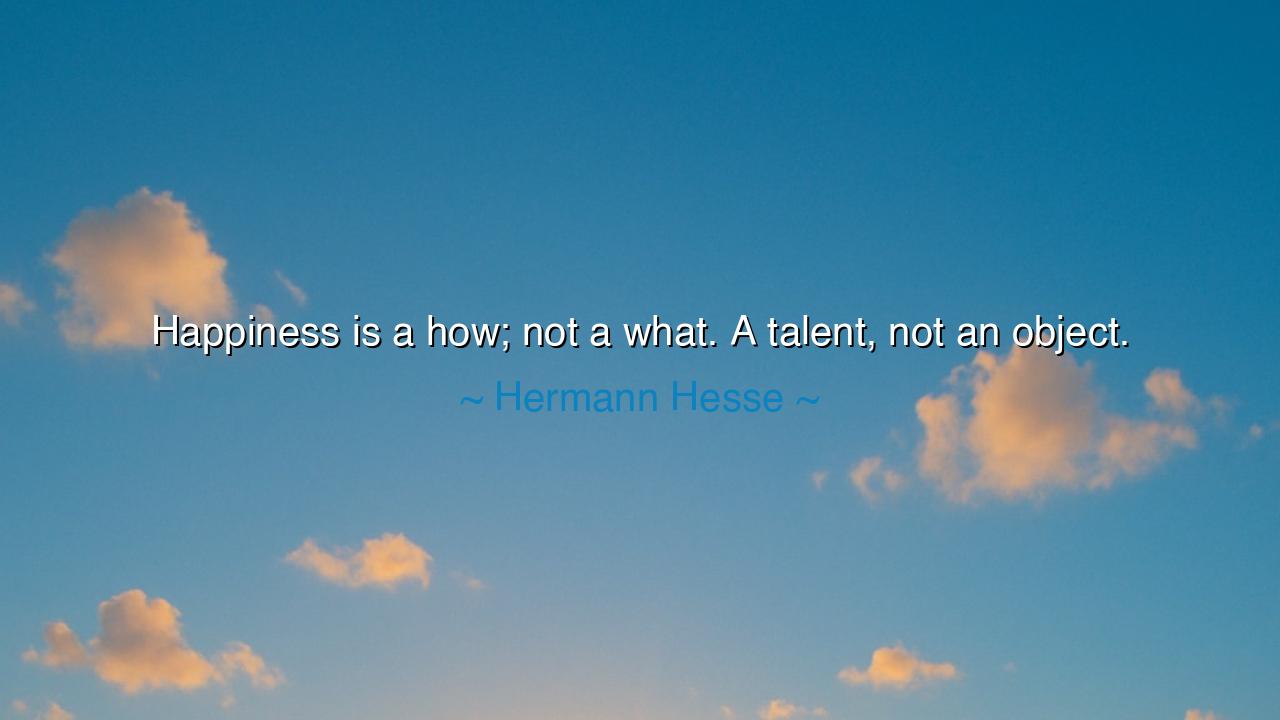
Happiness is a how; not a what. A talent, not an object.






The words of Hermann Hesse — “Happiness is a how; not a what. A talent, not an object.” — shimmer like a river under the sun, flowing deep with ancient wisdom. In this single sentence, the great mystic of the modern age reveals a truth that sages and philosophers have known since the dawn of thought: that happiness is not something to be found or possessed, but something to be practiced. It is not a treasure buried in the world, but a skill of the soul, a rhythm of being that must be learned, cultivated, and lived.
Hesse, who wrote of seekers and wanderers, of Siddhartha and Steppenwolf, knew the ache of the human heart — the endless pursuit of fulfillment in things, in pleasures, in victories that soon turned to dust. His own life was marked by exile, solitude, and struggle, yet he found, in the quiet spaces of reflection, that joy is not born from circumstance but from awareness. When he says that happiness is a how, he means that it is a way of walking through life — a manner of seeing, of responding, of breathing. It is not the mountain climbed, but the grace with which one takes each step.
In the ancient world, this truth was whispered by many names. The Stoics called it eudaimonia — the flourishing of the spirit that comes from virtue, not from wealth or fortune. The Buddha spoke of it as the Middle Way, the serene balance between desire and detachment. And the Taoists, like Hesse’s own spiritual kin, taught that joy is found not in striving, but in flowing with the great current of existence. These teachings, though clothed in different tongues, all say the same: happiness is a practice, a harmony of the heart that arises when one lives in accordance with truth, gratitude, and inner peace.
Consider the life of Viktor Frankl, the Austrian psychiatrist who endured the horrors of the concentration camps during the Second World War. Stripped of everything — freedom, possessions, even family — he discovered within that despair a secret source of strength. “Everything can be taken from a man,” he wrote, “but one thing: the last of the human freedoms — to choose one’s attitude in any given set of circumstances.” In that choice, he found the how of happiness — the ability to find meaning and light, even in the darkness. This is the talent Hesse speaks of: the art of keeping the soul alive when all else is lost.
To call happiness a talent is to remind us that it must be learned, like music or painting. One must tune the heart, practice gratitude, train the mind to dwell not in what is missing but in what is. The child is born with wonder, yet the world teaches him to chase instead of to see. The wise, however, return to wonder — they learn again to take joy in the simple, the ordinary, the present. They do not wait for happiness to appear as an object; they create it as an act of being.
There is a sacred power in this understanding. If happiness is a how, then no fate, no poverty, no misfortune can take it away. For it lives not in the hands, but in the heart; not in the world, but in the way one moves through it. The warrior may stand amid ruins and still find peace; the artist may face rejection and still find beauty; the wanderer may have no home and yet be at home everywhere. Happiness becomes not the prize of the fortunate, but the birthright of the awakened.
Let this truth, then, be carved into your memory: do not chase happiness as though it were a star to be caught. Instead, become the sky in which it shines. Practice the how — gratitude in the morning, patience in hardship, kindness toward others, and harmony within yourself. Live as though each breath is a gift, each moment a chance to create meaning. In this way, you become not a seeker of joy, but its source.
So remember the teaching of Hermann Hesse: Happiness is a how; not a what. A talent, not an object. Cultivate it as you would a garden. Tend to it with care, feed it with gratitude, and let it grow in the light of presence. For the true artist of life does not wait for joy to arrive — he creates it with every act, every thought, every breath. And when you learn this art, you will discover that happiness was never far away; it was simply waiting within you, ready to be lived.






AAdministratorAdministrator
Welcome, honored guests. Please leave a comment, we will respond soon